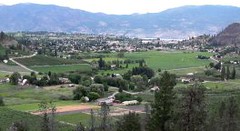Sustainable Prosperity
The Penticton Western ran a great article last week, covering a valley-wide research study that tried to identify the best possible futures for the region. It's called the Okanagan Sustainable Prosperity Strategy (PDF). A quote from the introduction that could be applied to Summerland's OCP process right now:
It goes further in by painting two very different pictures of the Okanagan's future. Of course they're extremes, and the timeline is probably too compressed, but it's a fascinating thought experiment. First, the bad news:
Pretty bleak, and it's exaggerated for dramatic effect...but driving between Kelowna's downtown and OUC this week made the possibility seem all too real. Sprawling box stores, highway development, isolated suburbs, nasty traffic and brown haze in the air, and don't even get me started about the slash 'n burn hillside developments on Westside. But the report goes on to paint a much rosier picture of the other potential future:
In Summerland, the "Sunshine Eclipse" isn't going to happen any time soon, but sustainable prosperity would seem to be a respectable goal. Read through the last quote again with this little town in mind -- it sounds just right.
"There are forces at work that have made this the right time for new thinking and action on shaping our region's next steps in development. The Okanagan region stands at the proverbial fork in the road where difficult choices must be made. Very rarely does a community have the opportunity to choose its future. More often changes take place incrementally, invisibly, and one morning residents wake up and realize that the qualities they knew and loved are no longer there. The Okanagan Partnership for Sustainable Prosperity is about taking responsibility for protecting what is important today while setting the stage for enabling what is desired for tomorrow."
It goes further in by painting two very different pictures of the Okanagan's future. Of course they're extremes, and the timeline is probably too compressed, but it's a fascinating thought experiment. First, the bad news:
"Sunshine Eclipse: In 2014, the region wakes to a sun shrouded with haze and a land turned over to asphalt and automobiles. Gone are the apple and cherry orchards, long ago replaced by fast-food outlets. The drive from Kelowna to Vernon has become an unceasing pattern of strip malls, subdivisions, and office parks. Jobs and housing abound but too many of them are dead-end low wage jobs with little opportunity for growth and pay too little to enable homeownership. Further, there is little evidence of natural landscapes except for the increasingly rare view of the lake and the distant hills. However, that view is more a mirage than an affirmation of the region's once great quality of life. The lake has constant swim advisories. Cities and communities in the region seem to be at constant war for both tax dollars and new development. In short, a new feudalism has emerged. This was the Okanagan that no one ever imagined could develop."
Pretty bleak, and it's exaggerated for dramatic effect...but driving between Kelowna's downtown and OUC this week made the possibility seem all too real. Sprawling box stores, highway development, isolated suburbs, nasty traffic and brown haze in the air, and don't even get me started about the slash 'n burn hillside developments on Westside. But the report goes on to paint a much rosier picture of the other potential future:
"Sustainable Prosperity: In this scenario in 2014, the region wakes up to look out at an Okanagan where environmental protection goes hand in hand with economic prosperity. The preservation of the region's natural assets indeed became the region's greatest economic asset. The Okanagan has become a little paradise in the mountains an island community surrounded by wilderness yet well planned with distinct community character. The universities and research institutes are well respected nationally and have developed a successful track record in commercializing technology. Growth is guided by regional goals and development enabled by strategic investments. The regional districts and First Nations strengthen their identities and work in a complementary manner. A new collaborative culture takes shape. 10 years from now, the Okanagan becomes a model for growth with sustainability."
In Summerland, the "Sunshine Eclipse" isn't going to happen any time soon, but sustainable prosperity would seem to be a respectable goal. Read through the last quote again with this little town in mind -- it sounds just right.


2 Comments:
The "sustainable prosperity" scenario sounds just right, but who is going to get us there, and how? A longer term committment to that style of growth and prosperity has to trump the immediate gains of development and retail. I love the idea of community input and participation rather than counting on a select group but it has to be organized and sustained, not just a reaction to one specific flashpoint at a time (a la water shortage and Myron's original Faulder post). The Natural Step framework (http://www.naturalstep.ca/scp/sustainablecommunities.html)is still the best I've seen but until I devote the time and energy to getting it started I won't be pointing any fingers.
By Tannis, at 3:35 p.m.
Tannis, at 3:35 p.m.
I think that identifying the people who are in it for the long haul is a good first step. Learning together would be the next step -- sharing research and ideas like we've started to do is helping me see the potential for the bigger picture, rather than just getting angry over specific issues.
By Jeremy, at 11:23 p.m.
Jeremy, at 11:23 p.m.
Post a Comment
<< Home